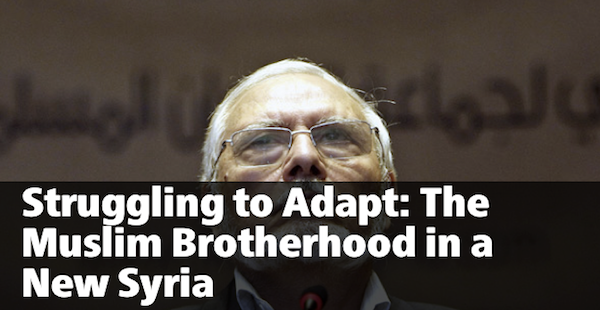Muslimbrüder kämpfen um Einfluss in Syrien
upg. Die USA und andere westliche Länder zögern mit Waffenlieferungen an die syrische Opposition aus Angst, die Waffen könnten in die Hände islamistischer Extremisten geraten. Wie stark der Einfluss der sunnitisch geprägten Muslimbruderschaft und der ebenfalls sunnitisch geprägten fundamentalistischen Bewegung der Salafisten im heutigen Syrien wirklich ist, hat der schwedische Journalist und Syrienkenner Aron Lund in einem soeben erschienenen Buch analysiert. Infosperber veröffentlicht hier die Quintessenz, die Aron Lund am 7. Mai auf Carnegieendowment.org veröffentlicht hat.
—
STRUGGLING TO ADAPT: THE MUSLIM BROTHERHOOD IN A NEW SYRIA
The Muslim Brotherhood was Syria’s strongest opposition faction when the uprising against Bashar al-Assad erupted in March 2011, but it was entirely based in exile. Its aging, exiled leadership is now struggling to influence Syria’s youthful revolt. Its efforts to exercise control are buoyed by the disorganized state of the opposition both abroad and in Syria, but the rise of militant Salafism has complicated its attempts to co-opt fighters on the ground.
Key Themes
- The Brotherhood remains the most important Syrian opposition faction in exile, but it has largely failed to root itself in the insurgency in Syria.
- The organization exerts influence inside Syria through a network of informal alliances with Islamist figures and rebel commanders, working through family connections and »independent” charitable organizations.
- Internal divisions between the so-called Hama and Aleppo branches hobble the group and contributed to a split in early 2011.
- The Brotherhood is threatened by the rise of militant Salafi groups that question its relatively moderate ideology and undercut its attempts to recruit disaffected Sunni youth.
Findings
- The Syrian Brotherhood is not as strong as commonly believed. The incessant focus on the Brotherhood by the Assad regime, Western nations, and rival opposition groups has helped it build a fearsome reputation. Its actual political and organizational capability appears to be far more modest.
- The failures of others have benefited the Brotherhood. The real reason for the group’s success in the exile community is the extreme disorganization of the rest of the opposition. As long as rival actors cannot get their act together, the Brotherhood will win by default.
- The Brotherhood tries to distance itself from extremism. Despite its theocratic ambitions and a past history of sectarian violence, the Brotherhood now promotes a moderate Islamist approach and seeks to accommodate concerns about its ideology. Since 2011, it has consistently cooperated with secular groups, spoken in favor of multiparty democracy, and worked through mainstream opposition frameworks such as the Syrian National Council, the National Coalition of Syrian Revolutionary and Opposition Forces, and the Free Syrian Army.
- Several armed groups linked to the Brotherhood fight in Syria. The leadership refuses to admit to having an armed branch, but Brotherhood exiles have been funding armed groups since late 2011. The organization now controls or sponsors dozens of small paramilitary units inside Syria.
FORTSETZUNG HIER SEITEN 2 BIS 9
—
The post New report on the Muslim Brotherhood appeared first on Syria Comment.
—
Themenbezogene Interessenbindung der Autorin/des Autors
Der schwedische Journalist und Syrien-Kenner Aron Lund hat soeben das Buch «Struggling to Adapt – The Muslim Brotherhood in a New Syria» veröffentlicht.









